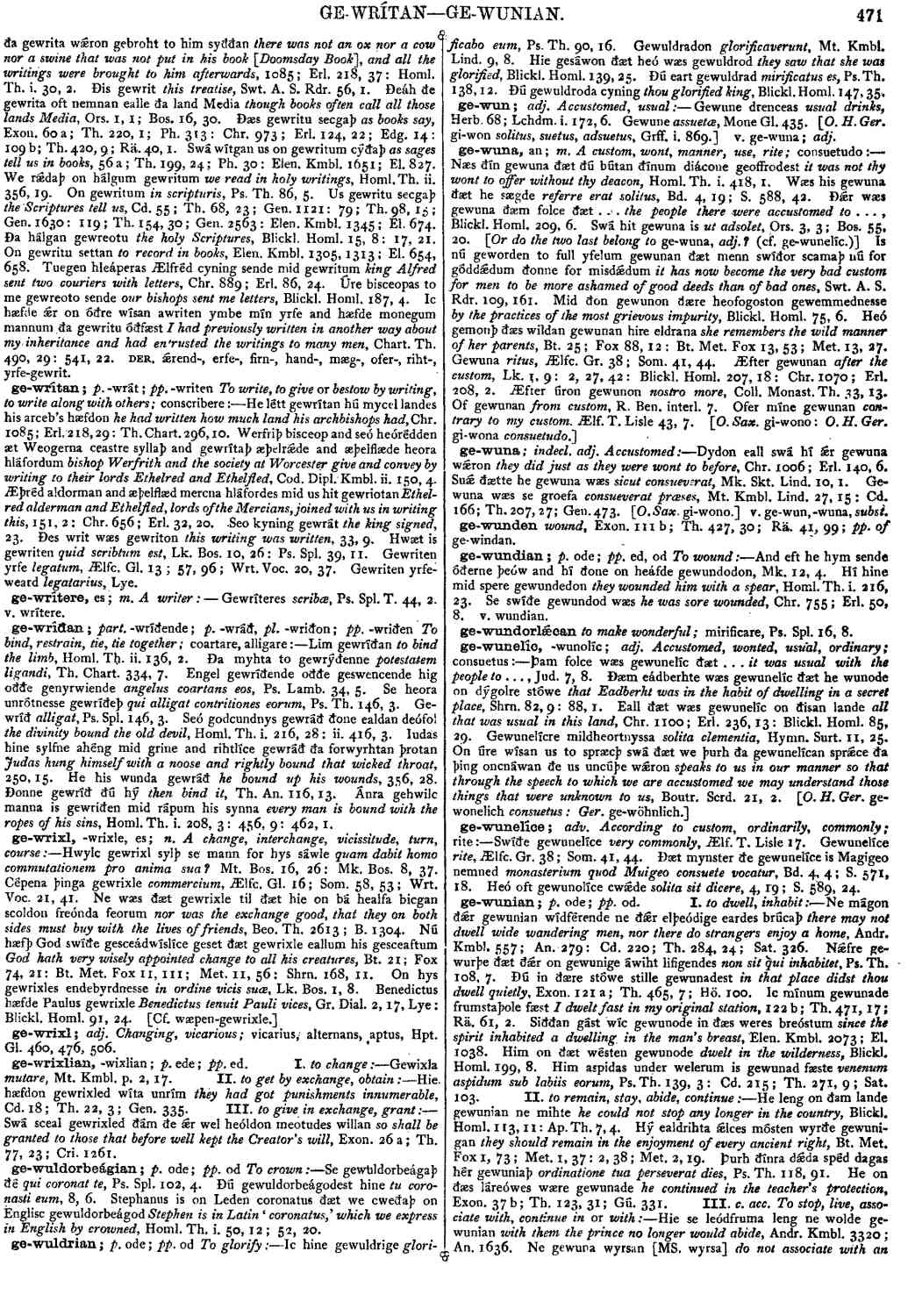ge-wunian
- verb [ weak ]
-
Ne mágon ðǽr gewunian wídférende ne ðǽr elþeódige eardes brúcaþ
there may not dwell wide wandering men, nor there do strangers enjoy a home,
- Andr. Kmbl. 557 ;
- An. 279 :
- Cd. 220 ;
- Th. 284, 24 ;
- Sat. 326 .
-
Nǽfre gewurþe ðæt ðǽr on gewunige áwiht lifigendes
non sit qui inhabitet,
- Ps. Th. 108, 7 .
-
Ðú in ðære stówe stille gewunadest
in that place didst thou dwell quietly,
- Exon. 121 a ;
- Th. 465, 7 ;
- Hö. 100 .
-
Ic mínum gewunade frumstaþole fæst
I dwelt fast in my original station,
- 122 b ;
- Th. 471, 17 ;
- Rä. 61, 2 .
-
Siððan gást wíc gewunode in ðæs weres breóstum
since the spirit inhabited a dwelling in the man's breast,
- Elen. Kmbl. 2073 ;
- El. 1038 .
-
Him on ðæt wésten gewunode
dwelt in the wilderness,
- Blickl. Homl. 199, 8 .
-
Him aspidas under welerum is gewunad fæste
venenum aspidum sub labiis eorum,
- Ps. Th. 139, 3 :
- Cd. 215 ;
- Th. 271, 9 ;
- Sat. 103 .
-
He leng on ðam lande gewunian ne mihte
he could not stop any longer in the country,
- Blickl. Homl. 113, 11 :
- Ap. Th. 7, 4 .
-
Hý ealdrihta ǽlces mósten wyrðe gewunigan
they should remain in the enjoyment of every ancient right,
- Bt. Met. Fox 1, 73 ;
- Met. 1, 37 :
- 2, 38 ;
- Met. 2, 19 .
-
Þurh ðínra dǽda spéd dagas hér gewuniaþ
ordinatione tua perseverat dies,
- Ps. Th. 118, 91 .
-
He on ðæs láreówes wære gewunade
he continued in the teacher's protection,
- Exon. 37 b ;
- Th. 123, 31 ;
- Gú. 331 .
-
Hie se leódfruma leng ne wolde gewunian
with them the prince no longer would abide,
- Andr. Kmbl. 3320 ;
- An. 1636 .
-
Ne gewuna wyrsan [MS, wyrsa]
do not associate with an inferior,
- Exon. 80 a ;
- Th. 301, 22 ;
- Fä. 23 .
-
Ðæt hine on ylde eft gewunigen wilgesíðas
that with him in his age remain his loved comrades,
- Beo. Th. 44 ;
- B. 22 .
-
Ðæt hy ðis lǽne líf long gewunien
that they continue long in this poor life,
- Exon. 62 b ;
- Th. 230, 33 ;
- Ph. 481 .
-
Se árwyrþa bisceop gewunade oft secgan
reverentissimus antistes solet referre,
- Bd. 3, 13 ;
- S. 538, 7 :
- 4, 23 ;
- S. 594, 38 :
- 24 ;
- S. 596, 31 :
- 5, 2 ;
- S. 614, 26 .
-
Ðá sǽde Sompeius ðæt Joseph gewunode monige wundor to wyrcenne
Sompeius said that Joseph used to work many miracles,
- Ors. 1, 5 ;
- Bos. 28, 12 .
-
Him gewunode ðæt he wæs geond ðæt wésten sundorgenga
was accustomed to go through the desert by itself,
- Blickl. Homl. 199, 5 .
-
Swá swá he gewunode
sicut consueverat,
- Mk. Bos. 10, 1 .
-
Ðes hálga wer wæs gewunod ðæt he wolde gán on niht to sǽ
this holy man was accustomed to go at night to the sea,
- Homl. Th. ii. 138, 3 .
-
His mód to ðám woruldsǽlþum gewunod wæs
his mind was accustomed to worldly prosperity,
- Bt. 1 ;
- Fox 4, 2 .
Bosworth, Joseph. “ge-wunian.” In An Anglo-Saxon Dictionary Online, edited by Thomas Northcote Toller, Christ Sean, and Ondřej Tichy. Prague: Faculty of Arts, Charles University, 2014. https://bosworthtoller.com/16922.
Checked: 1